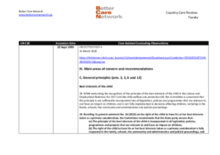Displaying 121 - 130 of 660
The first aim of this study was to examine differences in the socio-emotional functioning of adopted and institution-reared children in Chile. The second aim of this study was to examine the influence of adoption related variables on the psychological adjustment of adopted children.
This study is a systematic review of the scholarly literature to better understand caregiver-related factors (e.g., characteristics, proficiencies) that contribute to permanency and placement stability, in order to provide a stronger foundation for developing and improving caregiver recruitment and training procedures.
The current study examined the attachment development of 92 internationally adopted Chinese girls, focusing on the influence of type of pre-adoption care (institutional versus foster care) and sensitive adoptive parenting.
This study summarizes findings from caregiver usability tests, and provides a wide variety of caregiver-generated suggestions for improving foster and adoptive caregiver training curricula that are applicable to all caregiver training efforts.
Framed by relational dialectics theory, a contrapuntal analysis of 104 photolistings examined the discursive tensions of what it means to be an “adoptable” child.
This study examined parent-child relationship variables (child attachment, parental sensitivity, and prior parenting experience) and child behavior problems in parents and their international adopted children with and without a cleft lip and palate.
This chapter focuses on the U.S. as the nation with the largest number of adoptions. Although adoptions represent a small portion of family growth, from a demographer’s point of view they are worth investigating.
This country care review includes the Concluding Observations of the Committee on the Rights of the Child.
The present study aims to identify the adoptee, parents and family related predictors of the adoptive parents' parenting stress, exploring direct and indirect effects. Fifty Portuguese adolescents' adoptive parents participated in this study.
This review aims to provide social workers with a resource to guide their decision‐making by evaluating both the benefits and risks associated with open adoption.

